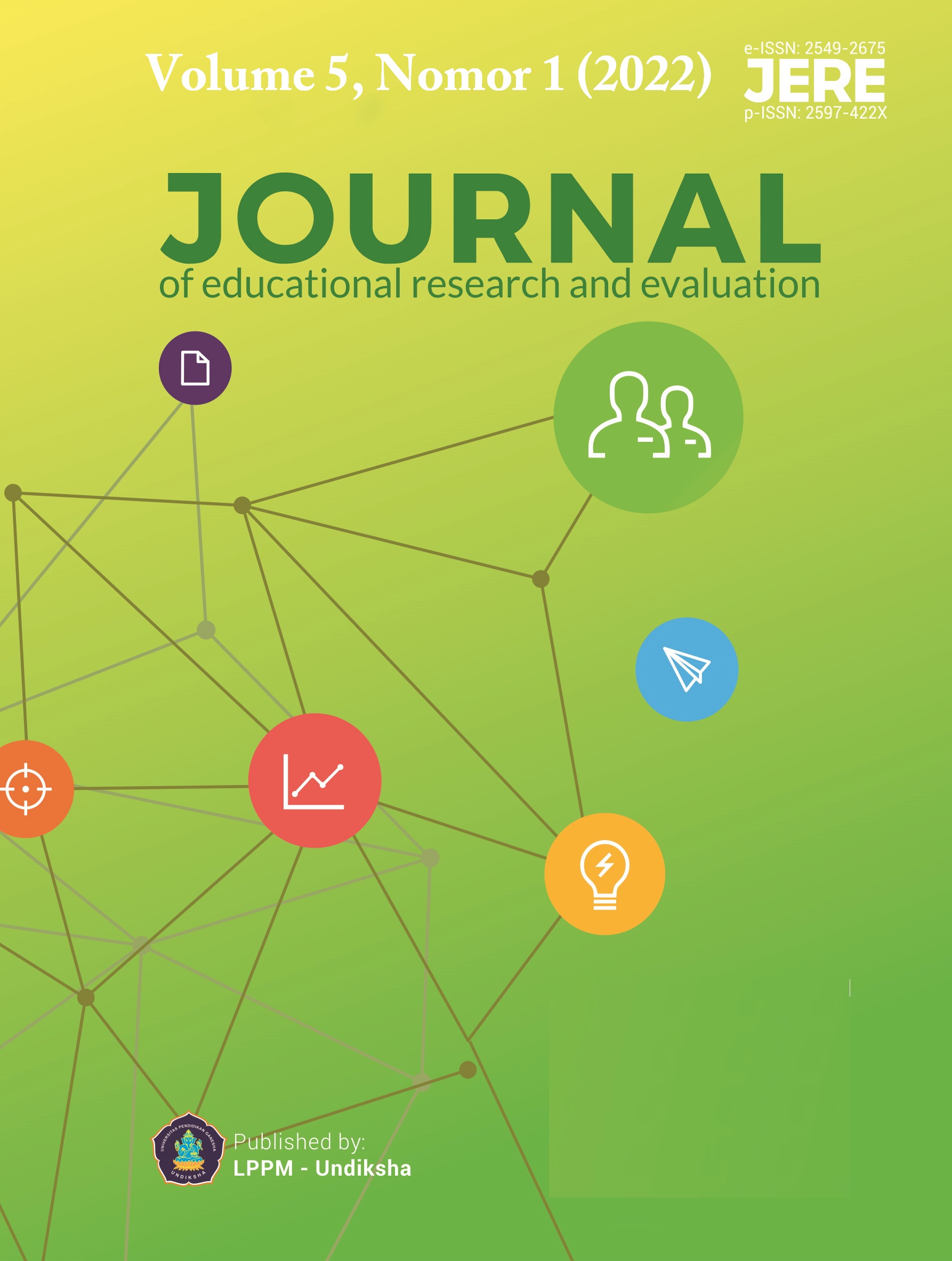The Effect of E-Portfolio in Project-Based Learning toward Learner Autonomy and Writing Competency
DOI:
https://doi.org/10.23887/jere.v5i1.29982Keywords:
e-portfolio, project based learning, learner autonomy, writing competencyAbstract
The National Education objectives can be achieved through learning process and a valid assessment process. Assessment has a strong involvement in the learning process. The purpose of this study is to investigate the effect of e-portfolio in project-based learning toward learner autonomy and writing competency experienced by X MIPA students of SMA Negeri 7 Denpasar. The research design was post-test only control group design. The research instruments used were questionnaire and writing test. Questionnaire was used to test learner autonomy, while writing test was used to test students’ writing competency. Data were analyzed by employing One-way Anova and Manova. The results of this study showed that there is a significant effect of E-portfolio in Project-Based Learning toward learner autonomy and writing competency of X MIPA students of SMA Negeri 7 Denpasar. The mean score of students who were taught by using e-portfolio in project-based learning strategy is higher than the mean score who were taught by using conventional strategy. E-portfolio in Project-Based Learning also revealed potentially promotes students’ creativity, problem solving skills, and communication through technology skills.
References
Alawdat, M. (2014). English writing students’ perspective of using e-Portfolios in the writing class. International Journal of Language and Linguistics, 2(6-3), 1-11. https://doi.org/10.11648/j.ijll.s.2014020603.11
Buzzetto-More, N. (2010). Assessing the efficacy and effectiveness of an e-portfolio used for summative assessment. Interdisciplinary Journal of e-Learning and learning Objects, 6(1), 61-85. https://www.learntechlib.org/p/44774/
Chye, S. Y., Liau, A. K., & Liu, W. C. (2013). Student teachers’ motivation and perceptions of e-portfolio in the context of problem-based learning. The Asia-Pacific Education Researcher, 22(4), 367-375. https://doi.org/10.1007/s40299-012-0022-4
Gülbahar, Y., & Tinmaz, H. (2006). Implementing project-based learning and e-portfolio assessment in an undergraduate course. Journal of Research on Technology in Education, 38(3), 309-327. https://doi.org/10.1080/15391523.2006.10782462
Hallam, G., Harper, W., McGowan, C., Hauville, K., McAllister, L., & Creagh, T. (2008). Australian e-Portfolio Project: ePortfolio use by university students in Australia. Australian Learning & Teaching Council: Strawberry Hills, NSW. https://eportfoliopractice. qut. edu. au/information/report/index. jsp
Harmer, J. (2006). Review of “How to teach writing”. Electronic Journal of Foreign Language Teaching, 3(2), 246-248. https://e-flt.nus.edu.sg/wp-content/uploads/2020/09/v3n22006/rev_laborda.pdf
Jianfeng, C., Raj, G. S., & Ai, J. T. T. (2018). The Correlations among Learning Motivation, Autonomy and Language Proficiency in Chinese EFL Context. LEARN Journal: Language Education and Acquisition Research Network, 11(1), 1–14. https://eric.ed.gov/?q=learning+motivation&id=EJ1225852
Koraneekij, P., & Khlaisang, J. (2015). Development of learning outcome based e-portfolio model emphasizing on cognitive skills in pedagogical blended e-learning environment for undergraduate students at faculty of education, Chulalongkorn University. Procedia-Social and Behavioral Sciences, 174, 805-813. https://doi.org/10.1016/j.sbspro.2015.01.664
Lukitasari, M., Handhika, J., & Murtafiah, W. (2018, March). Higher order thinking skills: Using e-portfolio in project-based learning. In Journal of Physics: Conference Series (Vol. 983, No. 1, p. 012047). IOP Publishing. https://doi.org/10.1088/1742-6596/983/1/012047
Macías, J. A. (2012). Enhancing project-based learning in software engineering lab teaching through an e-portfolio approach. IEEE Transactions on Education, 55(4), 502-507. https://ieeexplore.ieee.org/abstract/document/6182725
Mahasneh, O. M. (2020). A Proposed Model for the University Students' E-Portfolio. Journal of Education and e-Learning Research, 7(1), 28-33. https://eric.ed.gov/?id=EJ1248214
Marhaeni, A A I N., Artini, L P., Ratminingsih, N M., Dewi, N L P E S., Kusuma, I. P. I. (2017). Asesmen Autentik dalam Pembelajaran Bahasa Inggris (1st ed.). Rajawali Pers.
Ortega, D. P., & Minchala, O. E. (2017). Assessing Students in an Authentic and Ongoing Manner in the English Classroom. 7(3), 159–165. http://dx.doi.org/10.17507/tpls.0703.01
Rizqiya, R., Pamungkas, M. Y., & Inayah, R. (2017). The use of POWER learning as a learning strategy to improve students writing competency. OKARA: Jurnal Bahasa dan Sastra, 11(2), 253-262. http://dx.doi.org/10.19105/ojbs.v11i2.1491
Sardareh, A. (2013). Defining Assessment for Learning: A proposed definition from a sociocultural perspective. Life Science Journal, 10(2). https://www.academia.edu/download/51011970/Defining_Assessment_for_Learning_A_propo20161221-10789-1u3z6wy.pdf
Song, J. (2020). Developing English Abilities of Autonomous Learning for Undergraduates in the Environment of Ecological Affordance. English Language Teaching, 13(7), 104. https://doi.org/10.5539/elt.v13n7p104
Syarifah, E. F. (2019). Project-Based Learning To Develop Students ’ Ability And Creativity In Writing Narrative. Indonesian EFL Journal, 5(1), 85-94. https://doi.org/10.25134/ieflj.v5i1.1627
Tonogbanua, J. R. (2018). Exploring collaborative e-portfolio project for teaching and learning academic writing. Asian EFL Journal Research Article, 20(12.3), 173-193. https://www.researchgate.net/profile/Jet_Tonogbanua/publication/330899341_Exploring_collaborative_E-portfolio_project_for_teaching_and_learning_academic_writing/links/5c6c11c5a6fdcc404ebc5070/Exploring-collaborative-E-portfolio-project-for-teaching-and-learning-academic-writing.pdf
Wenden, A. L. (1998). Metacognitive knowledge and language learning. Applied Linguistics, 19(4), 515–537. https://doi.org/10.1093/applin/19.4.515
Yastibas, A. E., & Yastibas, G. C. (2015). The use of e-portfolio-based assessment to develop students’ self-regulated learning in English language teaching. Procedia-social and behavioral sciences, 176, 3-13. https://doi.org/10.1016/j.sbspro.2015.01.437
Downloads
Published
How to Cite
Issue
Section
License
Authors who publish with the Journal of Evaluation and Research in Education (JERE) agree to the following terms:
- Authors retain copyright and grant the journal the right of first publication with the work simultaneously licensed under a Creative Commons Attribution License (CC BY-SA 4.0) that allows others to share the work with an acknowledgment of the work's authorship and initial publication in this journal.
- Authors are able to enter into separate, additional contractual arrangements for the non-exclusive distribution of the journal's published version of the work (e.g., post it to an institutional repository or publish it in a book), with an acknowledgment of its initial publication in this journal.
- Authors are permitted and encouraged to post their work online (e.g., in institutional repositories or on their website) prior to and during the submission process, as it can lead to productive exchanges, as well as earlier and greater citation of published work. (See The Effect of Open Access)











